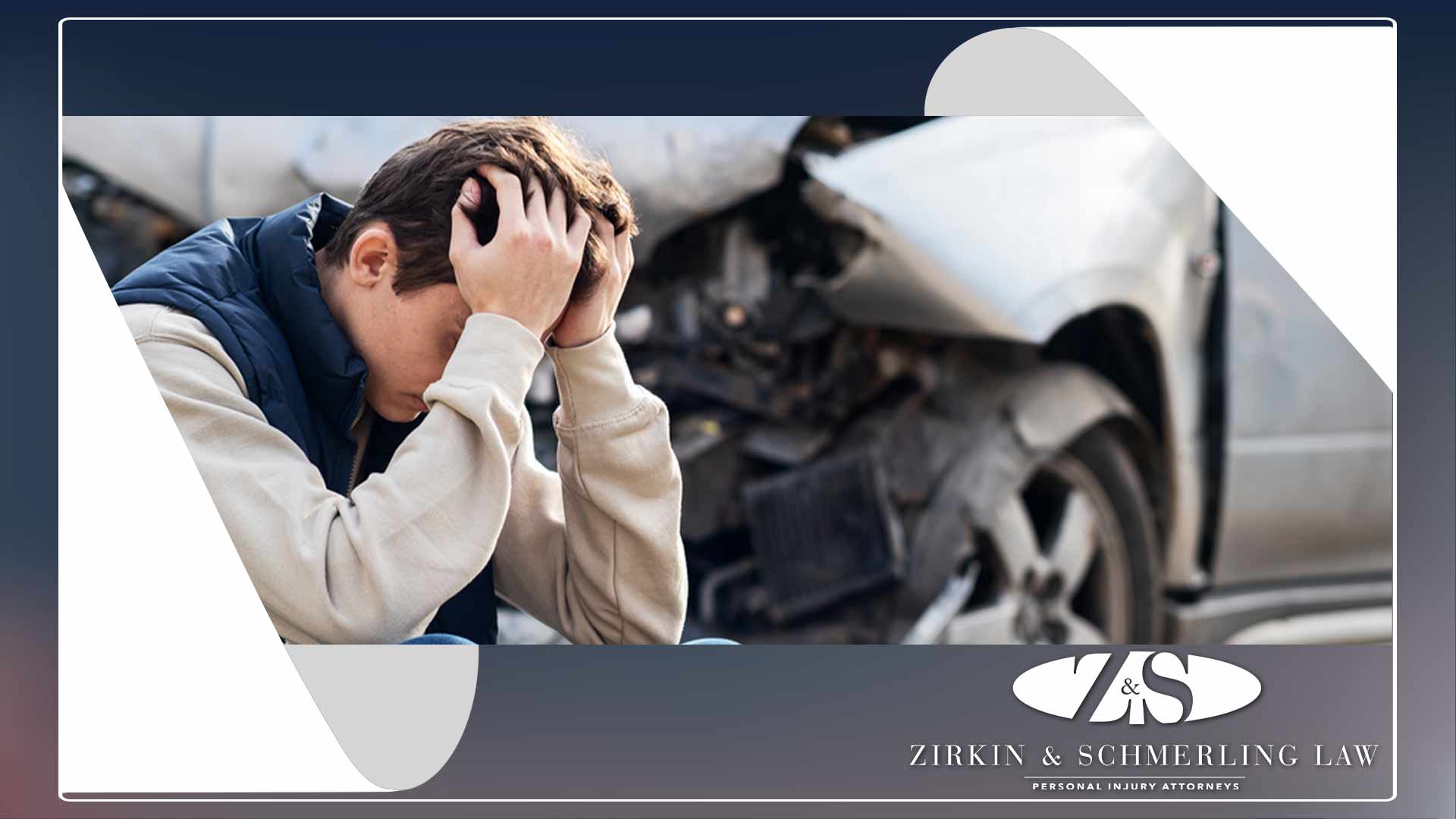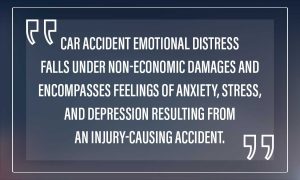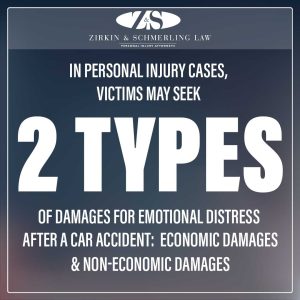
Can I Sue For Emotional Distress After a Car Accident?
You may already know that you can receive compensation for physical injuries sustained in a car accident.
But did you know that an accident attorney may also secure compensation for your emotional distress after a car accident?
Does Maryland Law Allow Suing for Emotional Distress After a Car Accident?
In personal injury cases, victims may seek two types of damages for emotional distress after a car accident:
- Economic damages, such as medical bills, lost wages, and property damage, are quantifiable and supported by documentation like invoices and pay stubs.
- Non-economic damages, including pain, suffering, and emotional distress, are less tangible and subjective in their assessment.

Car accident emotional distress falls under non-economic damages in a lawsuit and encompasses feelings of anxiety, stress, and depression resulting from an injury-causing vehicle accident.
However, the Maryland law typically requires some physical manifestation of injury related to mental suffering to recover monetary damages for emotional distress.
How Do You Substantiate Emotional Distress Claims After a Car Accident?
To back up a claim and win a car accident emotional distress claim, your personal injury attorney will have to collect evidence such as medical diagnosis, documented psychological symptoms, receipt of medical care, or a prescribed treatment regimen.

Your physician, therapist, and psychologist will document the symptoms and severity of emotional distress by highlighting its correlation with physical injuries.
Medical experts familiar with your emotional distress support a victim’s claim by establishing a clear connection between physical and emotional injuries.
Let your lawyer know if you have sought medical treatment, psychological counseling, or another type of care for your emotional distress.
It’s also a good idea to keep a daily record of the severity of your psychological symptoms and the extent to which they reduce your quality of life.
Does Intent Impact Claims for Emotional Distress?
An accident attorney may file a claim for compensation for emotional distress that may have been unintentionally or intentionally inflicted. In some cases, if the accident lawyer can prove that emotional distress was intentionally inflicted, you may be entitled to receive substantially greater compensation.
An example of the intentional infliction of psychological injuries is when an individual is the victim of a driver engaged in acts of road rage.
Extent of Emotional Distress

When your Zirkin & Schmerling attorney is preparing your claim, it is helpful if you can explain the extent of your psychological injuries. Any car accident or injury, whether minor or major, has the potential to inflict a certain degree of mental anguish.
If your emotional distress is so severe that it interferes with your normal daily function, you have a better chance of recovering compensation.
For example, consider whether your mental state after the accident has prevented you from going to work, caring for your family, driving to school or appointments, or caring for yourself.
Limits on Emotional Distress Car Accident Compensation for Emotional Distress
When filing your claim, your accident attorney may seek compensation for your anxiety, fear, depression, sleep loss, and similar problems. Like many other states, Maryland has damage caps for personal injury lawsuits.
In 2024, Maryland’s pain and suffering damages cap for injuries and wrongful death lawsuits is $935,000.
Statute of Limitations for Personal Injury Lawsuits
In Maryland, the statute of limitations for civil lawsuits, including personal injury cases, typically requires claims to be filed within three years from the date the claim “accrues,” as outlined in Md. Code Cts. & Jud. Proc., § 5-101 (2024).
Generally, a claim accrues on the date of injury if the individual was aware of the injury when it occurred. Therefore, under Maryland law, individuals usually have a three-year window from the date of injury to initiate a personal injury lawsuit in court unless a more specific statute of limitations applies to the case.
There are some exceptions (listed below), so it is always advisable to speak with an attorney to discuss your case specifics.
Exceptions to the Statute of Limitations for Car Accident Emotional Distress
There are a few exceptions to Maryland’s statute of limitations, providing extensions in certain car accident emotional distress cases:
- Legal Disability: If the injured party is legally disabled when their claim accrues, meaning they cannot manage their affairs without supervision, the limitation period does not commence until the disability is lifted. Maryland law considers individuals under 18 or mentally incompetent as legally disabled. Once the disability ceases, the injured person must file suit within either three years or the applicable limitation period, whichever comes first (Md. Code Cts. & Jud. Proc., § 5-201 (2024)).
- Fraudulent Concealment: If the responsible party fraudulently conceals the injury, preventing the injured person from discovering it, the statute of limitations does not start until the fraud is discovered or should have been found (Md. Code Cts. & Jud. Proc., § 5-203 (2024).
- Defendant’s Absence from Maryland: If the defendant leaves Maryland before the injury claim arises, the statute of limitations is paused during their absence. The clock begins to run again upon the defendant’s return to Maryland (Md. Code Cts. & Jud. Proc., § 5-205(b) (2024)).
How Is Emotional Stress Car Accident Compensation Calculated?
Determining damages for emotional distress in a Maryland car accident lawsuit involves primarily two methods: the “multiplier” method and the “per diem” method.
- Multiplier Method: The multiplier method entails multiplying your total economic damages by a specific number to calculate emotional distress damages. This multiplier typically ranges between 1 and 5, depending on the severity of your emotional distress. Factors such as the extent and duration of your suffering and its impact on your life determine the multiplier. Additionally, the credibility of the evidence presented is evaluated to ascertain the appropriate multiplier.
- Per Diem Method: Conversely, the per diem method seeks to assign a monetary value to each day of emotional distress experienced. This daily amount is then multiplied by the number of days you endured emotional distress due to the car accident.

The laws related to suing for emotional distress after a car accident are complicated, so contact our team to determine which calculation method applies to your case.
Questions About Emotional Distress Car Accident Compensation? Let Us Help You File a Claim
Winning compensation for emotional distress claims after a car accident can be challenging and typically feels invasive. You deserve an experienced attorney to protect your best interest and legal rights during this process.
